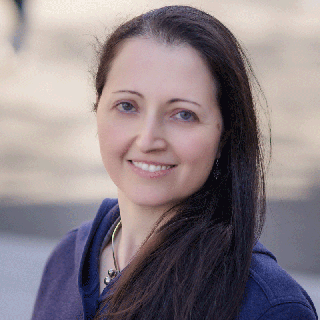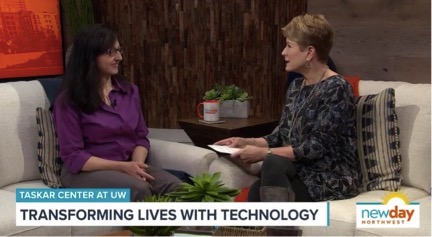December 20, 2024 At HuskyADAPT‘s holiday toy adaptation event in November, about 80 volunteers adapted toys, ranging from a baseball pitching machine and spinning art kit to lava lamps, remote control cars and a bilingual play drum. The volunteers connected the toys to a switch that can make it easier for children with disabilities to interact with the object in a way that’s accessible to them, such as pressing a button, moving their head or blowing air. For example, a…
Category: Partners-campus
Spring 2024 Research Showcase
May 30, 2024 The closing event for CREATE’s Community Day 2024 on May 20th, this research showcase was co-sponsored by HuskyADAPT. Posters and presentations A11yBoard: Making Presentation Slideshow Reading and Editing Accessible to Blind Users Designing human-AI and multimodal interactions to make presentation slideshow reading and editing accessible. Zhuohao (Jerry) Zhang, Gene S-H Kim, Jacob O. Wobbrock A11yBoard poster Ability-Based Design Mobile Toolkit: Developer Support for Runtime Interface Adaptation Based on Users’ Abilities To enable apps to respond to users’…
Ben Taskar Memorial Event
January 26, 2024 In January 2024, the CREATE community was invited to participate in the Taskar Center’s 2024 Annual Ben Taskar Memorial Event, themed “Transportation and Responsible AI.” Sessions Project Poster Viewing and Team Discussions Explore innovative projects from the course on “Responsible Data Science in Urban Spaces” under the guidance of Anat Caspi, TCAT director, contributing to Dr. Caspi’s recent Human Rights Education Award. Community Townhall Meeting with Dragomir Anguelov oin us for a captivating discussion with Dragomir Anguelov,…
Accessible eSports Showcase 2023: Event Recap
In April 2023, CREATE hosted its first ever Accessible eSports Showcase event, bringing together members of the CREATE community, local community organizations, tech and games Corporate Partners, and folks from all over the Seattle area looking to learn about and celebrate ongoing strides being made in making video games more inclusive and accessible to people with disabilities. Zillow Commons in the Bill & Melinda Gates Center was transformed into a gamer’s playground with big-screen projections of racing and party games,…
Community Day & Research Showcase 2022
CREATE’s 2nd Annual Community Day was well attended with 100 registered participants and presenters. We’re pleased with the show of strong community, the return to in-person (and also virtual) panel discussions, and a research showcase of 14 project teams. This year’s panels addressed the disproportionate impact of access to assistive technology on children with disabilities in BIPOC and immigrant communities as well as the issues that arise with the intersection of accessibility and biometric technologies. We were honored to host…
CREATE Community Day & Research Showcase 2021
CREATE Community Day 2021 was a rich program that included an important discussion of the concerns and approaches to just, sustainable accessibility research that puts the needs of community members with disabilities front and center.
CREATE members highlighted what their labs are doing, with time to hear about a variety of individual projects. Read on for a sample of the presentations.
Caspi to lead collaborative $11.45M Transportation Data Equity Initiative

Tools like Google Directions and OneBusAway give up-to-date travel and transit information to make regional transit easier for most. But mobility applications focus on efficiency and shortest paths, leaving out information critical to people with disabilities, older adults, and anybody needing more support. The Taskar Center for Accessible Technology, led by CREATE Associate Director for Translation Anat Caspi, and the UW’s Washington State Transportation Center will work with Microsoft, Google, the Washington Department of Transportation and other public and private…
AccessComputing shares UW CREATE’s launch and work toward accessibility
CREATE faculty are already internationally recognized for their contributions to assistive technology and accessible computing; by bringing them together under one organizational roof, CREATE will enable synergies and foster collaborations that enable faculty and students to become more than the sum of their parts.
Designing for the fullness of human experience

Anat Caspi and Taskar Center featured on King 5’s New Day Northwest A familiar face joined Margaret Larson on New Day NW this morning. Anat Caspi, Director of the Taskar Center and Director of Translation for the UW Accessibility Center, shared recent innovations from robotics to smart, sensing environments. Technology design has taken this stance about designing for the “average” person. And in many cases that is a big design mismatch to the needs and preferences of people who are…